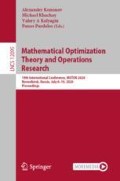Abstract
The paper examines an algorithm for finding approximate sparse solutions of convex cardinality constrained optimization problem in Hilbert spaces. The proposed algorithm uses the penalty decomposition (PD) approach and solves sub-problems on each iteration approximately. We examine the convergence of the algorithm to a stationary point satisfying necessary optimality conditions. Unlike other similar works, this paper discusses the properties of PD algorithms in infinite-dimensional (Hilbert) space. The results showed that the convergence property obtained in previous works for cardinality constrained optimization in Euclidean space also holds for infinite-dimensional (Hilbert) space. Moreover, in this paper we established a similar result for convex optimization problems with cardinality constraint with respect to a dictionary (not necessarily the basis).
This work was supported by the Ministry of science and education of the Russian Federation in the framework of the basic part of the scientific research state task, project FSRR-2020-0006.
Access this chapter
Tax calculation will be finalised at checkout
Purchases are for personal use only
References
Bollhofer, M., Eftekhari, A., Scheidegger, S., Schenk, O.: Large-scale sparse inverse covariance matrix estimation. SIAM J. Sci. Comput. 41(1), A380–A401 (2019). https://doi.org/10.1137/17M1147615
Bubeck, S.: Convex optimization: algorithms and complexity. Found. Trends Mach. Learn. 8(3–4), 231–358 (2015)
Chen, Z., Huang, C., Lin, S.: A new sparse representation framework for compressed sensing MRI. Knowl.-Based Syst. 188, 104969 (2020). https://doi.org/10.1016/j.knosys.2019.104969. http://www.sciencedirect.com/science/article/pii/S0950705119303983
Dempster, A.P.: Covariance selection. Biometrics 28(1), 157–175 (1972). https://doi.org/10.2307/2528966
Deng, Q., et al.: Compressed sensing for image reconstruction via back-off and rectification of greedy algorithm. Sig. Process. 157, 280–287 (2019). https://doi.org/10.1016/j.sigpro.2018.12.007. http://www.sciencedirect.com/science/article/pii/S0165168418303980
Dereventsov, A., Temlyakov, V.N.: Biorthogonal greedy algorithms in convex optimization. CoRR abs/2001.05530 (2020). https://arxiv.org/abs/2001.05530
Dong, Z., Zhu, W.: An improvement of the penalty decomposition method for sparse approximation. Sig. Process. 113, 52–60 (2015). https://doi.org/10.1016/j.sigpro.2015.01.012. http://www.sciencedirect.com/science/article/pii/S0165168415000353
Donoho, D.L.: Compressed sensing. IEEE Trans. Inf. Theor. 52(4), 1289–1306 (2006). https://doi.org/10.1109/TIT.2006.871582
Dou, H.X., Huang, T.Z., Deng, L.J., Zhao, X.L., Huang, J.: Directional \(l_0\) sparse modeling for image stripe noise removal. Remote Sens. 10(3) (2018). https://doi.org/10.3390/rs10030361. https://www.mdpi.com/2072-4292/10/3/361
Fan, J., Lv, J., Qi, L.: Sparse high-dimensional models in economics. Ann. Rev. Econ. 3(1), 291–317 (2011). https://doi.org/10.1146/annurev-economics-061109-080451
Figueiredo, M.A.T., Nowak, R.D., Wright, S.J.: Gradient projection for sparse reconstruction: application to compressed sensing and other inverse problems. IEEE J. Sel. Top. Sig. Process. 1(4), 586–597 (2007). https://doi.org/10.1109/JSTSP.2007.910281
Gajare, S., Sonawani, S.: Improved logistic regression approach in feature selection for EHR. In: Abraham, A., Cherukuri, A.K., Melin, P., Gandhi, N. (eds.) ISDA 2018 2018. AISC, vol. 940, pp. 325–334. Springer, Cham (2020). https://doi.org/10.1007/978-3-030-16657-1_30
Gudkov, A.A., Mironov, S.V., Sidorov, S.P., Tyshkevich, S.V.: A dual active set algorithm for optimal sparse convex regression. Vestn. Samar. Gos. Tekhn. Univ. Ser. Fiz.-Mat. Nauki (J. Samara State Tech. Univ. Ser. Phys. Math. Sci.) 23(1), 113–130 (2019). https://doi.org/10.14498/vsgtu1673
Holmberg, K.: Creative modeling: variable and constraint duplicationin primal - dual decomposition methods. Ann. Oper. Res. 82, 355–390 (1998). https://doi.org/10.1023/A:1018927123151
Kampa, K., Mehta, S., Chou, C.A., Chaovalitwongse, W.A., Grabowski, T.J.: Sparse optimization in feature selection: application in neuroimaging. J. Global Optim. 59(2), 439–457 (2014). https://doi.org/10.1007/s10898-013-0134-2
Lu, Z., Li, X.: Sparse recovery via partial regularization: models, theory, and algorithms. Math. Oper. Res. 43(4), 1290–1316 (2018). https://doi.org/10.1287/moor.2017.0905
Lu, Z., Zhang, Y.: Sparse approximation via penalty decomposition methods. SIAM J. Optim. 23(4), 2448–2478 (2013). https://doi.org/10.1137/100808071
Luo, X., Chang, X., Ban, X.: Regression and classification using extreme learning machine based on l1-norm and l2-norm. Neurocomputing 174, 179–186 (2016). https://doi.org/10.1016/j.neucom.2015.03.112. http://www.sciencedirect.com/science/article/pii/S092523121501139X
Pan, L.L., Xiu, N.H., Fan, J.: Optimality conditions for sparse nonlinear programming. Sci. China Math. 60(5), 759–776 (2017). https://doi.org/10.1007/s11425-016-9010-x
Pun, C.S., Wong, H.Y.: A linear programming model for selection of sparse high-dimensional multiperiod portfolios. Eur. J. Oper. Res. 273(2), 754–771 (2019). https://doi.org/10.1016/j.ejor.2018.08.025. http://www.sciencedirect.com/science/article/pii/S0377221718307203
Sidorov, S.P., Faizliev, A.R., Khomchenko, A.A.: Algorithms for \(l_1\)-norm minimisation of index tracking error and their performance. Int. J. Math. Oper. Res. 11(4), 497–519 (2017). https://ideas.repec.org/a/ids/ijmore/v11y2017i4p497-519.html
Temlyakov, V.N.: Greedy approximation in convex optimization. Constr. Approx. 41(2), 269–296 (2015). https://doi.org/10.1007/s00365-014-9272-0
Teng, Y., Yang, L., Yu, B., Song, X.: A penalty palm method for sparse portfolio selection problems. Optim. Methods Softw. 32(1), 126–147 (2017). https://doi.org/10.1080/10556788.2016.1204299
Wipf, D.P., Rao, B.D.: Sparse Bayesian learning for basis selection. IEEE Trans. Signal Process. 52(8), 2153–2164 (2004). https://doi.org/10.1109/TSP.2004.831016
Xu, F., Deng, R.: Fast algorithms for sparse inverse covariance estimation. Int. J. Comput. Math. 96(8), 1668–1686 (2019). https://doi.org/10.1080/00207160.2018.1506108
Zhu, W., Dong, Z., Yu, Y., Chen, J.: Lagrange dual method for sparsity constrained optimization. IEEE Access 6, 28404–28416 (2018). https://doi.org/10.1109/ACCESS.2018.2836925
Author information
Authors and Affiliations
Corresponding author
Editor information
Editors and Affiliations
Rights and permissions
Copyright information
© 2020 Springer Nature Switzerland AG
About this paper
Cite this paper
Pleshakov, M., Sidorov, S., Spiridonov, K. (2020). Convergence Analysis of Penalty Decomposition Algorithm for Cardinality Constrained Convex Optimization in Hilbert Spaces. In: Kononov, A., Khachay, M., Kalyagin, V., Pardalos, P. (eds) Mathematical Optimization Theory and Operations Research. MOTOR 2020. Lecture Notes in Computer Science(), vol 12095. Springer, Cham. https://doi.org/10.1007/978-3-030-49988-4_10
Download citation
DOI: https://doi.org/10.1007/978-3-030-49988-4_10
Published:
Publisher Name: Springer, Cham
Print ISBN: 978-3-030-49987-7
Online ISBN: 978-3-030-49988-4
eBook Packages: Mathematics and StatisticsMathematics and Statistics (R0)

